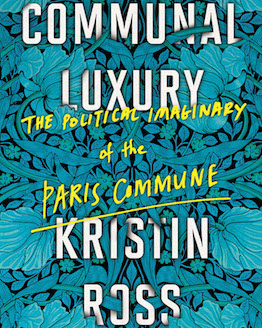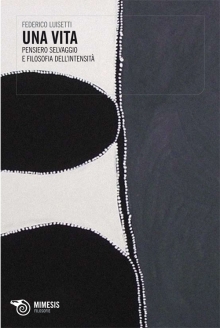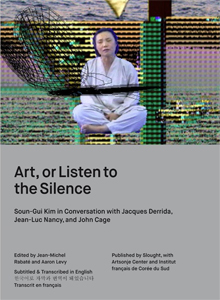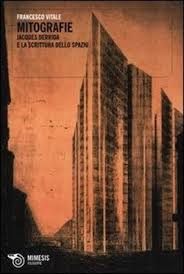Kristin Ross. Communal Luxury: The Political Imaginary of the Paris Commune. London: Verso, 2015. 156pp. £16.99/€24, 9781781688397.
Review by George Sotiropoulos (Athens, Greece)
Theoreticians who examine the history of this movement from a divinely omniscient viewpoint (like that found in classical novels) can easily demonstrate that the Commune was objectively doomed to failure and could not have been successfully consummated. They forget that for those who really lived it, the consummation was already there.
Situationist International, ‘Theses on the Paris Commune’, 18th March 1962.
Kristin Ross, I believe, would find this a fitting introduction for her Communal Luxury, whose guiding spirit is close to the one guiding the Situationists’ analysis of the Commune. This is not accidental since to a considerable extent both Ross and the Situationist International take up Karl Marx’s famous statement that the greatest value of the Paris Commune was its ‘working existence’. But the book does much more than develop Marx’s insight as Ross creatively revisits the debates and ideas https://www.acheterviagrafr24.com/viagra-pas-cher/ that the Commune has generated ever since it appeared. This also means that Ross’ book is not a typical work of history. Communal Luxury is rather a work of political theory, which instead of working at a conceptual abstract level, works through a historical event, the Paris Commune. This approach certainly fits well with Ross’ understanding of the relation between theory – and more broadly, thought – and action. But precisely in this context it is very important to make clear that the Paris Commune is not for Ross a point of application of an already formulated theory, which means to be verified through it. Communal Luxury may perhaps be best described as a theoretical study of a historical event, which even though it is not detailed, any person with an interest in the Paris Commune or in contemporary critical theory would benefit from reading it.
Ross understands the Commune as an event in the sense this concept has acquired in theoretical discourse: a rupture that opens up a new domain or field of possibilities. But she situates the beginning of the Commune-event, the date that the Commune started to become, much earlier that the usual date given by most commentators, including Alain Badiou. In fact, this difference may betray a different understanding between the relation of an event and its historical context, Ross’ understanding being perhaps closer to Deleuze who is more attentive to the past lines of intensity that lead to the outbreak of an event. For Ross, the actual, historical, Commune declared at the 18th of March, is part of a becoming whose first materialization is traced in the ‘popular reunions at the end of the Empire, the various associations and committees they spawned, and the revolutionary clubs of the Siege’ (14). This is not to deny that the Commune had https://www.acheterviagrafr24.com/prix-du-viagra-en-pharmacie/ certain negative preconditions, that without the Franco-Prussian War it may have well not appeared into the stage of history. But this in a sense is trivial; all popular uprisings bear testimony to a certain dysfunction, an out of the ordinary breakdown of the operations through which any sociopolitical formation is reproduced. From this point of view, the Paris Commune is one example of the well-documented relation between revolution and war. None of these is refuted by Ross. But as she points out, if ‘we begin with the state we end with the state’ (14), and not incidentally many who indeed begin with the state can only find in these 72 days of the Spring of 1871 weaknesses and lacks. But the Commune, Ross wants to argue, was
the practical negation of the state. If, thus, theory wants to be adequate to the praxis of the Commune it needs also not to start with the state but with the praxis that sought to negate it. In Deleuzian terms, if one wants to appreciate a becoming one has to start not with its negative conditions but with the productive desire and positive investments that animate it, small as they seem to be.
Another important theoretical principle guiding Communal Luxury is the one concerning thought and action, hinted at above. Ross offers a compact and succinct formulation of this principle: ‘actions produce dreams and ideas not the reverse’ (7). What this means practically for the book is reflected again in the choice to begin with collective practices, the clubs, the reunions and the associations, and not with the thought of an individual thinker whose influence then on the Commune would be measured. To be sure, individual intellectuals and revolutionaries have an important place in the book, from William Morris and Elisée Reclus to Karl Marx and Peter Kropotkin. But Ross is interested to show how the event of the Commune bears on the intellectual and political trajectory of these thinkers, on how their own individual becoming can be appreciated fully only in connection to the collective praxis of the Commune. But the scope of Ross’ analysis is not restricted to the relation of the Commune with the intellectual and political trajectory of famous revolutionaries; she rather incorporates this theme into a wider framework which seeks to challenge a linear and progressivist representation of history. This makes for one of the most fascinating aspects of Communal Luxury, since Ross skillfully branches out the Paris Commune in order to connect to the Russian peasant-communes, medieval Iceland, anarchist communism and debates within 19th century socialism up to current social movements (although the latter link is not developed in the main body of the analysis).
If Ross agrees with Marx that the Commune’s enduring legacy is its own working existence, at the heart of the imaginary motivating and at the same time nurtured by the works and days of the Commune, she traces the notion of ‘communal luxury’. The Paris Commune in this sense is not simply a form of government based on principles of radical democracy. This is for sure a real aspect of the Commune and Ross spends some time trying to show how the decentralized and bottom-up character of the Commune was not a historical exigency but a conscious practice. As Miguel Abensour would have it, the Commune was not a political form without a state but a form of democracy against the state. ((M. Abensour, Democracy against the State: Marx and the Machiavellian Moment, trans. Max Blechman and Martin Breaugh, (Cambridge: Polity Press, 2011).)) Yet the organizational dimension of the Paris Commune is part of a broader regime of desire and order of justice, which embrace social activities like production, education and artistic creation. The Paris Commune indeed, Ross maintains, sought to challenge the boundaries between these so-called ‘social fields’. Communal luxury, in this sense, is the symbol for a different form of socialization and subjectification which challenges and attempts to overcome both the divisions and hierarchies marking class society as well as its conceptions of wealth. At the place of the individual luxury that capitalism produces, always however along widespread misery and upon the shoulders of the toiling classes, the Commune offered the practical image of communal luxury. This ultimately marks a life which is rich and prosperous not because one accumulates and possesses individual wealth but because ‘everyone would have his or her share of the best’ (65). It is this legacy which
Ross traces in the basic idea of Reclus, Kropotkin and Morris that communism is the practical abolition of the ‘law of value’ and not simply a fairer application of it. This is also an idea, which some currents of Marxism have traced in Marx. While it cannot be elaborated here it is worth stressing its most radical implication: the task of a revolution is not to organize production and distribute money and commodities in a ‘fairer’ way, but to abolish and replace the current forms – and thus the guiding assumptions – through which human activity is realized, organized, evaluated, measured and classified. In brief, not a more just articulation of the same but a difference conception and order of what is just.
Surely, Ross’ analysis here can be criticized for idealizing or at least prettifying the Paris Commune. There are quite a few analyses, even by sympathetic authors, who have highlighted the many problems and insufficiencies of the Paris Commune’s ‘working existence’, for instance Murray Bookchin. ((Murray Bookchin, The Third Revolution Vol. 2: Popular Movements in the Revolutionary Era (London: Continuum, 1998).)) But Ross does not say that such problems and insufficiencies did not exist, nor is it a matter of registering a gap between ideal and reality. Her point is that all the failures to be amassed do not discredit the
political imaginary that the Commune offered as a practical experience. Still, I suspect she would not disagree that evading the Commune’s weaknesses and failures is also not wise and that a lengthier study would do certainly well to engage with them.
An equally important place in Ross’ analysis of the Paris Commune is stored for the notion of the ‘Universal Republic’, which registers the internationalism of the Commune, which in turn defies all attempts to incorporate the event into the national history of France. This internationalism is reflected more directly in the composition of the Communards and Ross does not forget to mention the outrage the presence of émigrés caused to the high and middle-classes. Recalling how the presence of immigrants in the revolt of December 2008 in Athens caused a similar outrage to the Greek Mass Media is enough to substantiate that insofar as subaltern revolts produce international communities of struggle they will never cease to be a scandal from the perspective of the nation-state. Yet, the internationalism of the Commune, Ross insists, far exceeds this aspect. Internationalism is rather an index of the Commune as a sociopolitical form, as a peculiar regime of desire and order of justice. The crux of Ross’ thesis is that the image of communal luxury cannot be enclosed into national borders; indeed, in so far as the Commune is against the state it is also against borders, hence the importance of the concept of the Universal Republic. Ross does not deny that the Commune may have implicated also patriotic sentiments, although perhaps her choice not to mention them may open her book to charges of one-sidedness. But, given the nature of the book in the end it is a matter of the line of intensity one wants to bring to light. At a time such as ours when subaltern struggles against austerity face the temptation to fall into ‘national solutions’ one cannot but praise Communal Luxury for its choice to stress the internationalism of the Paris Commune.
Unavoidably, looming large over any study of the Paris Commune, especially studies sympathetic to the event, is its bloody suppression and the massacre that followed the invasion of the French troops. Central to Communal Luxury is the argument that the Commune did not end in 28 May 1871; rather like its beginning is traced earlier, the Commune-event is extended to incorporate the trajectories of those it affected, following their journeys to London and Switzerland. It is not a matter therefore of willful evasion. There is a substantial theoretical assumption here, which in Deleuzian terms could be expressed as the non-identity between an event’s history and its becoming. This is a crucial point for it shields Ross’ analysis from empiricist accusations based on Commune’s supposed destined doom. And yet, history cannot simply be sidestepped, since this would risk leading to a romantic vision of struggles that undermines their historical repression and defeat. Given especially that Ross draws a link between the Commune and the Occupy movement –which, with the power of hindsight, also appears doomed to have been repressed– an in-depth reflection on the Paris Commune’s historical destiny is no secondary matter. Attempting this of course may have led the work astray, so the fact that it is not committed cannot be deemed a lack of Communal Luxury. But the problem remains and asks us to engage with it. Under the light of this problem Lenin’s dance
may be viewed under a more sympathetic light. The solution of the Bolsheviks, fore sure, may have been the worse, although the recently published in English work of Domenico Losurdo reminds us of the need to historicize the revolutionary experience of the 20th century. ((Dominico Losurdo, War and Revolution: Rethinking the 20th Century, trans. Gregory Elliot (London: Verso, 2015).)) In all events, the point here is that the problem of power and along with it the dialectic of democracy and dictatorship is real and the Commune is one historical instance which impels us to engage with it seriously.




